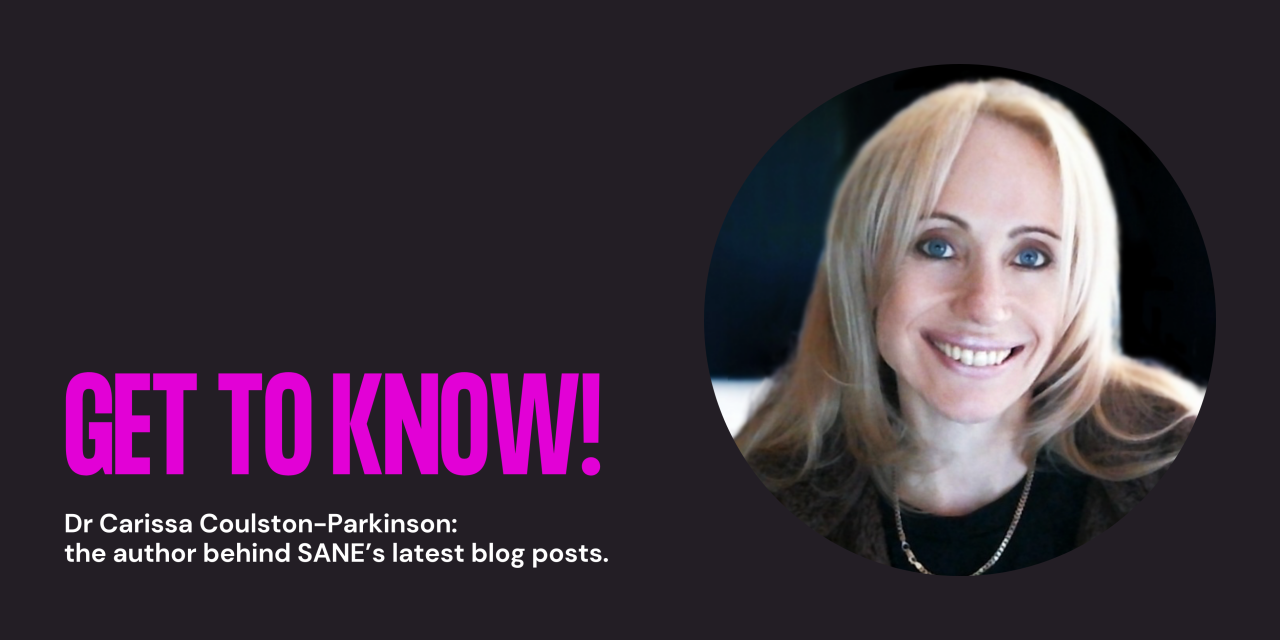The SANE Blog
Get to know Dr Carissa Coulston-Parkinson: The author behind SANE’s latest blog posts
Introducing Dr Carissa Coulston-Parkinson - the brains behind SANE’s latest series of blog posts, including topics on the Power of Psychology, International Men’s Day and Women’s Day, Human Rights Day, Challenges of the Festive Season, Adapting to the New Year, and Returning to School (just to name a few).
Dr Coulston-Parkinson is a compassionate and dedicated Clinical Psychologist with a profound understanding of complex mental health conditions. She has specialist knowledge in the areas of depression, bipolar disorder, anxiety, schizophrenia, intellectual disability, personality disorders, traumatic brain injury, and neurological conditions. Her research publications can be viewed here, and her expertise and insights into some of these conditions will continue on the SANE Blog this year.
Join the team at SANE as we get to learn more about Dr Coulston-Parkinson, why she chose a career in mental health, the challenges she sees in the complex mental health community, and how she believes their quality of life can be improved.
Dr Coulston-Parkinson, what led you to specialise in complex mental health conditions?
My interest in Clinical Psychology evolved from family experiences and values.
My mother was a young child when she and her family immigrated to Australia from Austria in the aftermath of World War II. Her father was a partisan during the war and the family suffered horrific consequences as a result of his efforts, imposed by the Nazi regime. They all survived and worked admirably hard to build a new life here but were marked by experiences that no child or adult should have to deal with.
My father's values also played a role in shaping my career path. He was a highly respected community man who volunteered much of his time to aiding those unemployed and facing financial hardship due to mental ill-health. I often accompanied him on home visits to these members of the community. His profession as a police officer also exposed him to highly distressing events during an era when there was inadequate support for the police force. He always maintained a stoic façade, but he carried signs of stress.
I came to learn how life events and trauma can impact on mental health, and I felt a natural calling towards helping those who struggled. I hoped that by pursuing a career in psychology, I could gain a better understanding of complex mental health conditions and make a difference.
What are some of the biggest challenges you see experienced amongst this community?
The biggest challenges I see in this community include difficulties with employment, relationship breakdowns, and problems with medication use.
In the workplace, mental health issues not only hinder job performance but can make it exceedingly difficult for many to sustain any form of employment at all. Many also incur job loss, not solely due to mental ill-health, but because of fears around social stigma and a lack of confidence that prevent them from discussing needs with their employer and attaining the support they could potentially receive.
Symptoms of mental ill-health can also strain relationships. They may impair an individual's ability to effectively function and communicate, leading to misunderstandings, conflict, and burnout amongst friends and family. The loss of primary relationships is common, and in severe & chronic mental health cases, meaningful connections are almost unattainable.
Finally, medications like antipsychotics and mood stabilisers are commonly prescribed for chronic conditions like schizophrenia and bipolar disorder, as well as acute psychosis. Electroconvulsive therapy (ECT) is also a last resort for severe and treatment-resistant depression. These therapies often have undesirable side effects like fatigue, weight gain, cognitive impairment, and others, adversely affecting physical health as well as social and interpersonal functioning. Medication compliance understandably falls, and many turn to alcohol or illicit substances to cope. This further interferes with employment, relationships, and overall mental and physical health.
What changes are you hoping to see to improve the quality of life for individuals and families living with complex mental health needs?
Healthcare providers like case managers and other professionals in public mental health settings frequently have over 50 clients at any given time to manage. Providing adequate care under these conditions is a formidable challenge, highlighting the need for a better healthcare provider-to-client ratio.
Improving this ratio could have a significant impact. For instance, some clients often need just a gentle nudge from a healthcare professional to engage with support services, as they may be hesitant due to anxiety or a lack of motivation. With more healthcare providers available to help identify services and accompany clients to initial appointments or meetings, many individuals might be encouraged to take active steps in managing their own care. This could be as straightforward as joining a client in an online support meeting.
Moreover, healthcare providers frequently encourage clients to advocate for themselves at work, with friends and family, and in other areas. Whilst ideal in theory, most individuals do not action this advice independently for several reasons. In many cases, the mere presence of a healthcare provider to bridge the gap with an employer and others of significance could be of huge benefit.
By increasing the number of healthcare providers, we could ensure that clients receive the support and encouragement they need to progress independently in their self-care and advocacy efforts.
To read Dr Coulston-Parkinson’s latest blog posts, visit the SANE blog.
SANE provides a range of free telephone and online support services for people over 18 years of age with complex mental health needs and their family, friends and carers. We offer different types and levels of support so you can find what works for you. Choose from counselling, peer support, online groups and events, 24/7 community forums, and online information and resources. Learn more at sane.org/get-support.
When you subscribe to the blog, we will send you an e-mail when there are new updates on the site so you wouldn't miss them.
